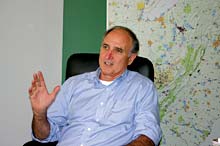As September turned to October, I had two very singular conversations over a four-day period—one with a scientist born in Pennsylvania and the other with a mystic who drew her first breath in India. Yet what they had to say differed little in terms of either analysis or prescription.

David Orr chairs the environmental-studies program at Oberlin College and lectures at four dozen other colleges and universities each year. Two of his books are academic bestsellers, and as an environmental educator, Orr has few peers. He came to town to keynote the 10th-anniversary celebration for SouthWings, the Asheville-based environmental group that puts eyes in the skies over clear-cuts, blasted mountains and disappearing estuaries throughout the Southeast. I caught up with Orr at the nonprofit’s offices on Haywood Street.
“Humanity has faced crises before, but there has never been such a high likelihood that we would destroy ourselves,” Orr declared. “Even nuclear war would probably have left survivors, but climate change, collapsing biodiversity and toxic pollutants are all hitting at once. Any one of them could do it.” He described his recent correspondence with Wes Jackson (of The Land Institute) and Amory Lovins (of the Rocky Mountain Institute) about the appropriate public stance to take in the face of these bleak circumstances.
Jackson is utterly pessimistic about the prospect of a technological fix for modern society, and in his writings, he notes that since the invention of agriculture, human society has inexorably drawn down the Earth’s capital stock. So his life’s work has been trying to reinvent agriculture as a sustainable practice.
Lovins, on the other hand, tends to be an optimist who devotes his energies to inventing our way out of the shrinking ecological box we inhabit. His headquarters in Snowmass, Colo., is solar-powered, with an atrium where tropical-fruit trees grow. Lovins envisions hydrogen-fuel-cell-powered autos that will generate electricity for our homes and produce pure hot water as a byproduct.
Orr says he sees no use in preaching pessimism, because if people don’t believe that they can save themselves, they may not try. On the other hand, he finds no rational basis for optimism. There are few people alive who have devoted more time and attention to the living systems that sustain us, and Orr is convinced that we are in very deep trouble. “What we can talk about is hope,” he said. “We can hope for heroes. We can hope that many of us can be heroes. It will take heroic work for our species to survive, to make the changes necessary, but people are capable of heroism.”
Orr’s prescription fit my visit three days later with a woman who goes simply by the name Maya. Born to Dutch parents in India, she spent her childhood in Java during World War II. The Japanese invaded the island, forcing 10,000 women and children into a concentration camp while the men were taken to Japan. “They forced us into an area, put barbed wire entirely around it and a bamboo fence, and then guards,” Maya recalled, sitting beneath a photograph of Meher Baba. “And we starved for three years.”
Maya described how she and her mother and sisters scratched up a patch of lawn using a table knife. “Mother planted spinach—I don’t know where she got the seeds—and tomatoes that first year, but just as they got ripe they were always stolen, so we didn’t plant them again. We grew other greens and would eat mixed, chopped greens every day, so we would get some vitamins. But we were always hungry.”
Maya’s memory of that time is indelible: “Hunger is a terrible thing. All you can think about is food all day and at midnight. It gnaws at you; it eats your bones. Although Mother grew all she could and traded greens with others, even gave some away when there was extra, one morning we found all of the greens had been stolen. The dogs and cats disappeared quickly, and some people even ate rats.” She grimaced.
As we walked through Maya’s glorious West Asheville garden, her thoughts turned toward the near-term future. “There will be hunger,” she predicted. “Maybe not starvation here, but times will be very hard. We’re running out of oil; prices will go up, and a tomato might cost $5. The weather is changing, and who knows what farmers will be able to grow? The economy cannot hold; we’ve been living on credit. Hard times are coming.”
The two conversations left me musing on an ecological crisis that looks rather like the subprime-mortgage mess in which people borrowed excessively, anticipating that rising home values would help them pay the piper. But conditions changed.
Environmental conditions are changing too. This summer, the sea ice in the Arctic melted at a record rate, while the New Climate Almanac 2007, published by The Globe and Mail of Toronto, predicted that the U.S. wheat belt will disappear within 50 years. That’s what fed our nation’s rise to world power, a commodity at least as important as oil and rather more personally interesting. “There will be hunger.”
Maya’s prescription also echoes Orr’s. “It is time for us all to plant Victory Gardens,” she said.
This is the last gardening column of the year. Look for this section to return when the world starts greening again in the spring.


Before you comment
The comments section is here to provide a platform for civil dialogue on the issues we face together as a local community. Xpress is committed to offering this platform for all voices, but when the tone of the discussion gets nasty or strays off topic, we believe many people choose not to participate. Xpress editors are determined to moderate comments to ensure a constructive interchange is maintained. All comments judged not to be in keeping with the spirit of civil discourse will be removed and repeat violators will be banned. See here for our terms of service. Thank you for being part of this effort to promote respectful discussion.